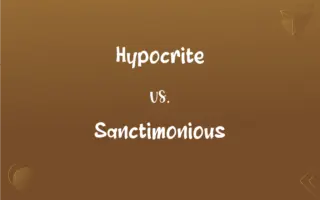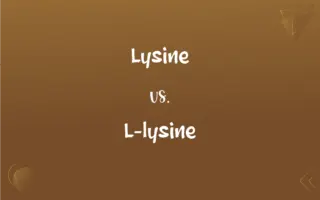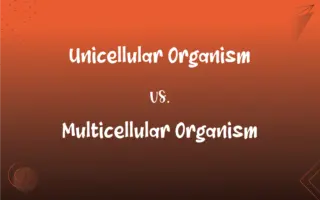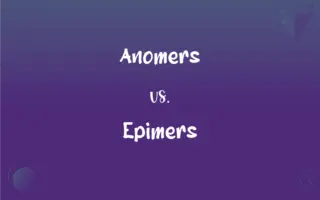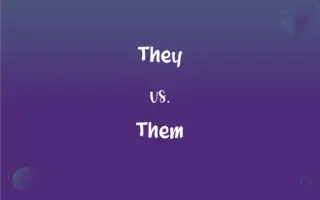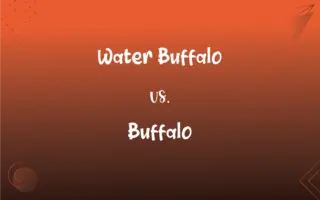Wisdom vs. Wit: What's the Difference?
Edited by Aimie Carlson || By Janet White || Published on October 16, 2023
"Wisdom" pertains to deep knowledge or insight from experience; "Wit" is keen intelligence or humor, often displayed quickly.
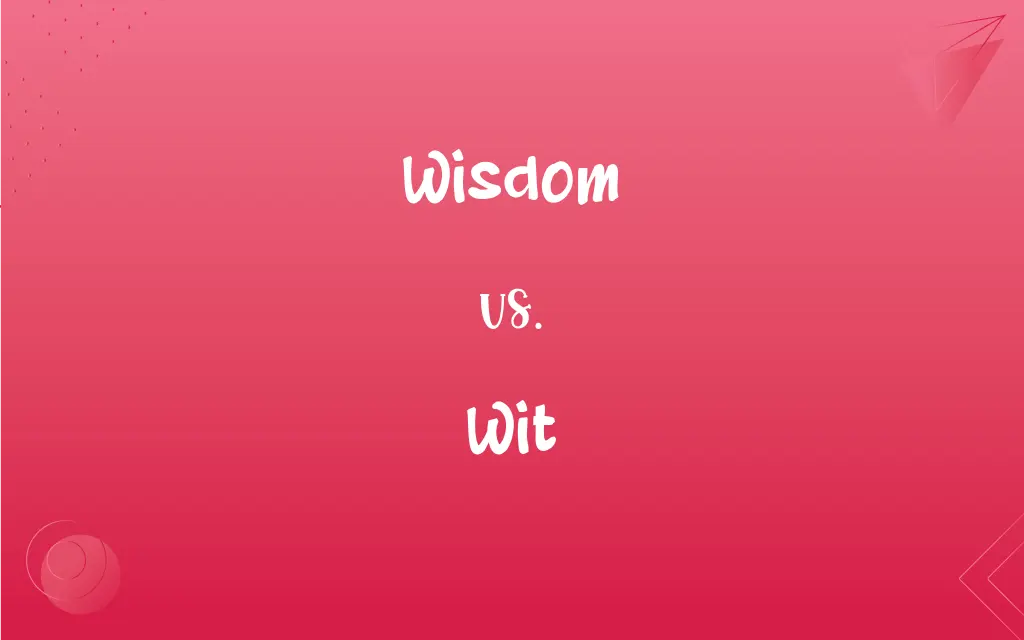
Key Differences
"Wisdom" denotes a deep understanding or knowledge that typically comes from life experience or introspection. It implies a thoughtful consideration of situations, often leading to valuable insights or judgments that transcend mere factual knowledge. Wisdom often serves as a guiding force in making decisions or understanding life's complexities.
Contrastingly, "Wit" refers to the ability to think quickly, often accompanied by humor. It's a sharpness of mind that allows one to make quick observations, often humorous ones, about a situation. Wit is what gives rise to clever quips, puns, and rapid-fire comebacks in conversations.
In their intersection, "Wisdom" and "Wit" can sometimes be found together in a person who not only understands the depths of life but can also articulate those depths in clever, humorous ways. Such a combination can be particularly engaging, with the wisdom grounding the humor and the wit making the insights more accessible.
However, the two are not synonymous. A person can possess wisdom without necessarily having wit. They might provide profound insights without comedic flair. Similarly, someone with wit might craft brilliant jokes without necessarily showcasing profound wisdom in their words.
Comparison Chart
Meaning
Deep knowledge or insight from experience.
Quick intelligence or humor.
ADVERTISEMENT
Usage
Often pertains to life's lessons or profound insights.
Refers to sharpness of mind, often humorously.
Synonyms
Sagacity, discernment, prudence.
Humor, cleverness, quickness.
Contextual Use
Applied in philosophical or reflective discussions.
Common in humorous or playful contexts.
Sentence Example
"Her wisdom was evident in her thoughtful decisions."
"His wit made him the life of the party."
Wisdom and Wit Definitions
Wisdom
Thoughtful and wise sayings or teachings.
Ancient texts are full of wisdom.
ADVERTISEMENT
Wit
Keen intelligence manifested quickly.
She impressed everyone with her sharp wit.
Wisdom
Profound knowledge of a particular subject.
He had the wisdom of the ages.
Wit
The capacity for inventive thought.
He demonstrated his wit with a clever solution.
Wisdom
Acquired knowledge from life's experiences.
His travels imparted great wisdom.
Wit
A humorous remark or action.
His comments were always full of wit.
Wisdom
The ability to judge correctly and follow the best course of action.
Her wisdom guided the team to success.
Wit
The natural ability to perceive and understand; intelligence.
Wisdom
The quality of being wise; sound judgment.
His wisdom was respected by all.
Wit
Often wits Practical intelligence; shrewdness or resourcefulness
Living by one's wits.
Wisdom
The ability to discern or judge what is true, right, or lasting; insight.
Wit
Wits Sound mental faculties; sanity
Scared out of my wits.
Wisdom
Common sense; good judgment
"It is a characteristic of wisdom not to do desperate things" (Henry David Thoreau).
Wit
(Archaic) A person of exceptional intelligence.
Wisdom
The sum of learning through the ages; knowledge
"In those homely sayings was couched the collective wisdom of generations" (Maya Angelou).
Wit
The ability to express oneself intelligently in a playful or humorous manner, often in overturning audience expectations
A writer with a scintillating wit.
Wisdom
Wise teachings of the ancient sages.
Wit
A person noted for this ability, especially in conversation
“My mother, the family wit and teaser, knew better than to joke about the disaster” (Donald Hall).
Wisdom
A wise outlook, plan, or course of action.
Wit
Intelligent playfulness or humor in expression, as in speech, writing, or art
Novels known for their wit and inventiveness.
Wisdom
Wisdom(Bible) Wisdom of Solomon.
Wit
To be or become aware of; learn.
Wisdom
(uncountable) An element of personal character that enables one to distinguish the wise from the unwise.
Wit
To know.
Wisdom
(countable) A piece of wise advice.
Wit
Sanity.
He's gone completely out of his wits.
Wisdom
The discretionary use of knowledge for the greatest good.
Wit
The senses.
Wisdom
The ability to apply relevant knowledge in an insightful way, especially to different situations from that in which the knowledge was gained.
Wit
Intellectual ability; faculty of thinking, reasoning.
Where she has gone to is beyond the wit of man to say.
Wisdom
The ability to make a decision based on the combination of knowledge, experience, and intuitive understanding.
Wit
The ability to think quickly; mental cleverness, especially under short time constraints.
My father had a quick wit and a steady hand.
Wisdom
(theology) The ability to know and apply spiritual truths.
Wit
Intelligence; common sense.
The opportunity was right in front of you, and you didn't even have the wit to take it!
Wisdom
(rare) A group of wombats.
Wit
Humour, especially when clever or quick.
The best man's speech was hilarious, full of wit and charm.
Wisdom
(rare) A group of owls.
Wit
A person who tells funny anecdotes or jokes; someone witty.
Your friend is quite a wit, isn't he?
Wisdom
The quality of being wise; knowledge, and the capacity to make due use of it; knowledge of the best ends and the best means; discernment and judgment; discretion; sagacity; skill; dexterity.
We speak also not in wise words of man's wisdom, but in the doctrine of the spirit.
Behold, the fear of the Lord, that is wisdom; and to depart from evil is understanding.
It is hoped that our rulers will act with dignity and wisdom that they will yield everything to reason, and refuse everything to force.
Common sense in an uncommon degree is what the world calls wisdom.
Wit
Know, be aware of constructed with of when used intransitively.
You committed terrible actions — to wit, murder and theft — and should be punished accordingly.
They are meddling in matters that men should not wit of.
Wisdom
The results of wise judgments; scientific or practical truth; acquired knowledge; erudition.
Moses was learned in all the wisdom of the Egyptians, and was mighty in words and in deeds.
Knowledge and wisdom, far from being one,Have ofttimes no connection. Knowledge dwellsIn heads replete with thoughts of other men;Wisdom, in minds attentive to their own.Knowledge, a rude, unprofitable mass,The mere materials with which wisdom builds,Till smoothed, and squared, and fitted to its place,Does but encumber whom it seems to enrich.Knowledge is proud that he has learned so much;Wisdom is humble that he knows no more.
Wit
(Southern American English) with
Wisdom
Accumulated knowledge or erudition or enlightenment
Wit
To know; to learn.
Brethren, we do you to wit [make you to know] of the grace of God bestowed on the churches of Macedonia.
Thou wost full little what thou meanest.
We witen not what thing we prayen here.
When that the sooth in wist.
Wisdom
The trait of utilizing knowledge and experience with common sense and insight
Wit
Mind; intellect; understanding; sense.
Who knew the wit of the Lord? or who was his counselor?
A prince most prudent, of an excellentAnd unmatched wit and judgment.
Will puts in practice what wit deviseth.
He wants not wit the dander to decline.
Wisdom
Ability to apply knowledge or experience or understanding or common sense and insight
Wit
A mental faculty, or power of the mind; - used in this sense chiefly in the plural, and in certain phrases; as, to lose one's wits; at one's wits' end, and the like.
I will stare him out of his wits.
Wisdom
The quality of being prudent and sensible
Wit
Felicitous association of objects not usually connected, so as to produce a pleasant surprise; also. the power of readily combining objects in such a manner.
The definition of wit is only this, that it is a propriety of thoughts and words; or, in other terms, thoughts and words elegantly adapted to the subject.
Wit which discovers partial likeness hidden in general diversity.
Wit lying most in the assemblage of ideas, and putting those together with quickness and variety wherein can be found any resemblance or congruity, thereby to make up pleasant pictures in the fancy.
Wisdom
An Apocryphal book consisting mainly of a meditation on wisdom; although ascribed to Solomon it was probably written in the first century BC
Wit
A person of eminent sense or knowledge; a man of genius, fancy, or humor; one distinguished for bright or amusing sayings, for repartee, and the like.
In Athens, where books and wits were ever busier than in any other part of Greece, I find but only two sorts of writings which the magistrate cared to take notice of; those either blasphemous and atheistical, or libelous.
Intemperate wits will spare neither friend nor foe.
A wit herself, Amelia weds a wit.
But my five wits nor my five senses canDissuade one foolish heart from serving thee.
Wit
A message whose ingenuity or verbal skill or incongruity has the power to evoke laughter
Wit
Mental ability;
He's got plenty of brains but no common sense
Wit
A witty amusing person who makes jokes
Wit
A natural aptitude for humor or cleverness.
His wit always lightened the mood.
Wit
A person characterized by such humor or intelligence.
She's a famous wit in literary circles.
FAQs
Is wisdom only about profound topics?
No, wisdom can pertain to any area of life, from the profound to the mundane.
Is wit always humorous?
Often, but not always. Wit can also refer to keen intelligence without humor.
Are wisdom and intelligence the same?
No, while related, wisdom involves insight and judgment, whereas intelligence is about processing and applying information.
Does wisdom always come with age?
Not necessarily, while age can offer experience, wisdom requires reflection and understanding.
Can wit be unintentional?
Yes, sometimes unintentional remarks or actions can be seen as witty.
Can wit be rehearsed?
Yes, people can prepare witty remarks or stories in advance.
Can wisdom be a negative trait?
While wisdom itself is neutral, being perceived as overly wise can sometimes be seen as pretentious or aloof.
Can someone be witty without being intelligent?
Wit often implies quick thinking, but one can be witty in a humorous context without deep intelligence.
Can one learn wisdom?
While life experiences can offer lessons, truly gaining wisdom requires reflection and open-mindedness.
How can one gain wisdom?
Through life experiences, introspection, learning from others, and being open to new perspectives.
How is wit used in literature?
Wit is often employed in literature for humor, satire, or to showcase a character's intelligence.
Is being witty a learned skill?
While some have a natural inclination, wit can be honed through practice and exposure to humor.
Can wit be offensive?
Yes, if not used judiciously, wit can sometimes offend or hurt others.
Can wisdom change over time?
Yes, as one gains more experiences and perspectives, their wisdom can evolve.
Is wisdom always beneficial?
Generally, yes. But like any trait, it's how it's applied that determines its benefit.
Is wisdom always serious?
Not necessarily. Wisdom can be shared in light-hearted or even humorous ways.
Can wit be used in formal settings?
While typically associated with humor, wit, when used appropriately, can enliven even formal discussions.
About Author
Written by
Janet WhiteJanet White has been an esteemed writer and blogger for Difference Wiki. Holding a Master's degree in Science and Medical Journalism from the prestigious Boston University, she has consistently demonstrated her expertise and passion for her field. When she's not immersed in her work, Janet relishes her time exercising, delving into a good book, and cherishing moments with friends and family.
Edited by
Aimie CarlsonAimie Carlson, holding a master's degree in English literature, is a fervent English language enthusiast. She lends her writing talents to Difference Wiki, a prominent website that specializes in comparisons, offering readers insightful analyses that both captivate and inform.

